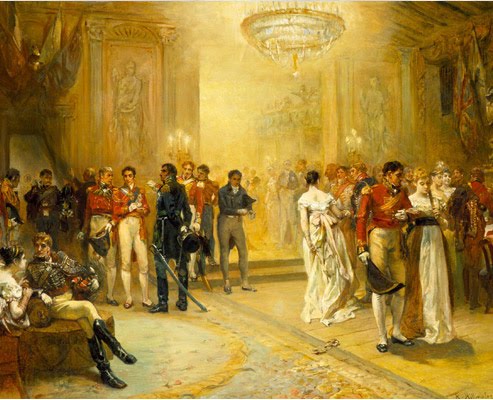“Desiderata” is an inspirational poem by Max Ehrmann in which he attempts to offer a positive outlook toward life. The world is often seen to be full of chaos, fraud, hypocrisy, loneliness, misery, and drabness. Through this poem, Max Ehrmann tries to inspire people to change their perception of the world as a cruel place and appreciate its beauty. He advises his readers to follow certain guidelines that would help them to lead a happy and fruitful life ahead.
About the Poet:
Max Ehrmann (September 26, 1872 – September 9, 1945) was an American writer, poet, and attorney from Terre Haute, Indiana, widely known for his 1927 prose poem “Desiderata” (Latin: “things desired”). He often wrote on spiritual themes.
Ehrmann died in 1945 and is buried in Highland Lawn Cemetery in Terre Haute, Indiana. In 2010 the city honored Ehrmann with a life-size bronze statue by sculptor Bill Wolfe. He is depicted sitting on a downtown bench, pen in hand, with a notebook in his lap. “Desiderata” is engraved on a plaque next to the statue, and lines from the poem are embedded in the walkway. The sculpture is in the collection of Art Spaces, Inc. – Wabash Valley Outdoor Sculpture Collection.
Desiderata: Summary
Stanza I
“Go placidly amid the noise and haste,
and remember what peace there may be in silence.
As far as possible without surrender
be on good terms with all persons.
Speak your truth quietly and clearly;
and listen to others,
even the dull and the ignorant;
they, too, have their story.“
The poem opens with a note of serenity and tranquility. In a loud and chaotic world, the poet advises people to “go placidly.” He reminds the readers that there is peace in silence. The poet asks us to “remember” the coolness and composure offered by silence. The poet speaks of being on “good terms with all persons.” He tries to inspire and motivate his readers with his words of wisdom. He is aware of the cruel traps of the world and hence says that we must be nice to others “as far as possible without surrender.” In a very prosaic tone, the poet advises his readers to speak the truth. Here, the truth may refer to an individual’s feelings, emotions, beliefs, thoughts, ideas, and experiences that are to be spoken: “quietly and clearly.” In other words, we should always be clear about our thoughts and perceptions. But at the same time, we must not try to impose our opinions on others. The poet also suggests people listen to others and pay attention to what they have to say. One has to be a good listener if one wishes to be heard. The poet points out that even those people who seem dull and ignorant have their own stock of stories to share. We must learn to pay equal attention to every individual.
Stanza II
“Avoid loud and aggressive persons; they are vexations to the spirit.
If you compare yourself with others,
you may become vain and bitter;
for always, there will be greater and lesser persons than yourself.
Enjoy your achievements as well as your plans.”
In the second stanza, the poet emphasizes keeping calm. The poet believes that loud and aggressive people are capable of disturbing one’s sense of being and, thus, advises people to stay away from them. According to the poet, people possessing loud and aggressive attributes might create a negative environment around us that would hamper our state of being and irritate our minds and soul. In other words, he advises us to keep good company that won’t disturb our mental peace. The poet also asks people not to compare themselves with others and be content with who they are. There will always be people who are better than us in some aspect and people who are worse than us. It is illogical and unfair to compare yourself with others to know your worth. The poet asks us to enjoy and celebrate our achievements but also look forward to the future and not deviate from our ultimate goals and plan ahead.
Stanza III
“Keep interested in your own career, however humble;
it is a real possession in the changing fortunes of time.
Exercise caution in your business affairs;
for the world is full of trickery.
But let this not blind you to what virtue there is;
many persons strive for high ideals;
and everywhere, life is full of heroism.”
The poet advises you to focus on your career no matter how humble it is. No matter what profession you opt for, it is important that you stay dedicated and determined and find joy in it. We must remain careful because the world is full of evil people who wish to manipulate and deceive others to get ahead of them. He warns the readers not to get tricked into business affairs in a world that is full of tricksters. However, it is not all evil in the world. We must not overlook the beauty and virtues in the world. The poet motivates us to live a meaningful life without being tricked and without ignoring the goodness in the world. There are people with heroic temperaments, morals, and ethics who can make this world a better place to live in.
Stanza IV
“Be yourself.
Especially do not feign affection.
Neither be cynical about love;
for in the face of all aridity and disenchantment,
it is as perennial as the grass. “
Here the poet asks us to embrace ourselves for who we are. He asks us to avoid pretensions and not fake love and affection, and neither be cynical about it. The feelings and emotions of an individual are sensitive and fragile, and one must not mock them. Even amidst all the miserable, hopeless, and stressful conditions in life, love is like perennial grass. The use of the grass simile is interesting here. What the poet means to express by this is that, like grass, love grows on its own, unconditionally and selflessly.
Stanza V
“Nurture strength of spirit to shield you in sudden misfortune.
But do not distress yourself with dark imaginings.
Many fears are born of fatigue and loneliness.
Beyond a wholesome discipline,
be gentle with yourself. “
In this stanza, the poet presents age as a vital factor in our lives. We learn from our past experiences. Age gives us wisdom and a certain authority to figure out what’s right and what’s wrong. Youth is often associated with immaturity, passion, impulse, restlessness, and foolishness. The poet asks us not to cling to the memories of the past and learn from the “counsel of the years.” The use of the words “kindly” and “gracefully” suggests how men become wiser with age. The “strength of spirit” is the strength of our mind and soul; it is an inner feeling of powerful emotions that help us to overcome any problems that come our way. The poet asks us to nurture this strength and use it for our success. The poet asks us to stay positive and not be distressed by thoughts that induce fear and anxiety. He further adds that these fears are the result of fatigue and loneliness. When we are isolated from the world, we often feel disturbed by the thought of loneliness and solitude. The poet advises us to have a certain standard of morals and ethics and a proper code of conduct. He asks us to discipline ourselves and love own self. If we are unable to love and appreciate ourselves, then we won’t succeed in doing the same for others, and hence, we can’t expect others to respect us. So, he asks us not to be too hard on ourselves and forgive ourselves for the mistakes we have committed and eventually learn from them.
Stanza VI
“You are a child of the universe,
no less than the trees and the stars;
you have a right to be here.
And whether or not it is clear to you,
no doubt the universe is unfolding as it should.”
This stanza opens with a philosophical note. The poet reminds us that we are a part of the universe. We are as much a part of the universe as the stars and trees are. We all, together, make the universe what it is. Our existence has a deeper meaning, and we have every right to be on Earth. This assertive tone in this particular stanza adds a lot of positivity and encouragement to the people in the poem. He tries to establish the idea that everything in this world happens for a reason. The Universe has its own plan, and it unravels its mysteries according to that plan. We are not supposed to be equipped with the necessary skills to understand everything that goes around us. The universe is too powerful and mysterious to be fathomed or controlled.
Stanza VII
“Therefore be at peace with God,
whatever you conceive Him to be,
and whatever your labors and aspirations,
in the noisy confusion of life keep peace with your soul. “
The poet asks us to “be at peace with God.” It is about putting our faith in the right place that gives us a ray of hope and inspiration. The poet appeals to a broader audience by not categorizing God into different religions. Everybody’s conception of God can be different, but no matter how they conceive God, he is always there to look after them. Amidst the chaos of confusion, aspirations, hard work, success, and failures, one must not forget to maintain peace within their mind and soul. Staying true to your heart and maintaining peace and harmony within yourself is a pivotal step in achieving inner peace.
Stanza VIII
“With all its sham, drudgery, and broken dreams,
it is still a beautiful world.
Be cheerful.
Strive to be happy. “
The poet looks at the positive aspect of this otherwise cruel and evil world. He says that amidst all the pretensions, monotony, drudgery, hypocrisy, and unfulfilled dreams, there is still beauty in this world. As they say, “beauty lies in the eyes of the beholder”- it is all on us to try and focus on the good things in life. The poet believes that no matter what comes their way, one must learn to remain cheerful and happy and look ahead for the brighter and better aspects of life.
You can also go through the Theme and Tone of Desiderata by Max Ehrmann.
Updated by Anjali Roongta on 24 April 2023
Some online learning platforms provide certifications, while others are designed to simply grow your skills in your personal and professional life. Including Masterclass and Coursera, here are our recommendations for the best online learning platforms you can sign up for today.
The 7 Best Online Learning Platforms of 2022
- Best Overall: Coursera
- Best for Niche Topics: Udemy
- Best for Creative Fields: Skillshare
- Best for Celebrity Lessons: MasterClass
- Best for STEM: EdX
- Best for Career Building: Udacity
- Best for Data Learning: Pluralsight
















